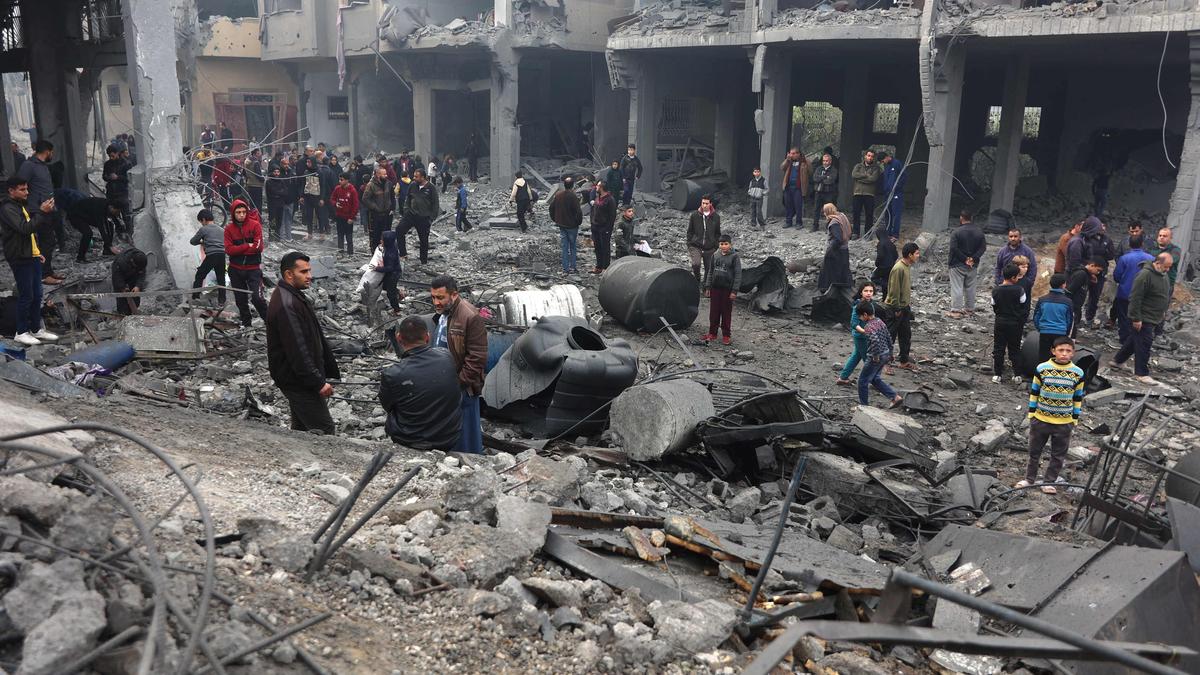 |
|
The fragile ceasefire agreement between Israel and Hamas hangs precariously after Israel launched fresh air strikes on Gaza on January 16, 2025, accusing Hamas of violating the terms of the deal. The agreement, brokered by Qatar and the United States, was intended to bring a temporary halt to the devastating war and facilitate the exchange of Israeli hostages held by Hamas for Palestinian prisoners. The deal was expected to be formally approved by the Israeli cabinet on Sunday, coinciding with the official commencement of the truce, but this now seems uncertain. The unexpected air strikes, which resulted in at least 75 deaths and hundreds of injuries in Gaza, have cast a deep shadow over the already delicate peace process and fueled widespread uncertainty. Prime Minister Benjamin Netanyahu's office issued a statement accusing Hamas of 'reneging on parts of the agreement' in a calculated attempt to extract further concessions.
The accusations leveled against Hamas have been vehemently denied by Hamas official Sami Abu Zuhri, who stated that there was 'no basis' for Israel's claims. This stark disagreement highlights the deep mistrust and conflicting narratives that continue to plague the peace process. The conflicting accounts underscore the complexities of achieving a lasting peace in the region. The events paint a picture of tense negotiations, marred by suspicion and accusations from both sides. Meanwhile, the Israeli cabinet has yet to formally approve the agreement, citing the need for Hamas to fully comply with the agreed-upon terms before the deal can proceed. This delay, along with the recent airstrikes, has raised serious doubts about the possibility of a sustained ceasefire and the likelihood of a permanent end to the conflict. Internal divisions within the Israeli government itself have further complicated the situation, with two prominent far-right ministers openly expressing their opposition to the agreement, further hindering its chances of ratification.
The human cost of the ongoing conflict is staggering. According to official figures, the war has claimed the lives of 1,210 Israelis, mostly civilians, in the October 7, 2023, Hamas attack, the deadliest in Israeli history. This attack also saw 251 Israelis taken hostage; 94 remain captive in Gaza. On the Palestinian side, the death toll is significantly higher. The Hamas-run health ministry in Gaza reports over 46,788 deaths, a figure deemed reliable by the UN, with the vast majority being civilians. The destruction of infrastructure and displacement of civilians in Gaza is extensive, leading to an urgent need for humanitarian aid. The devastation in Gaza, particularly affecting civilians, is highlighted by personal accounts like that of Saeed Alloush, whose family suffered significant losses in the recent airstrikes, turning the joy of a potential truce into profound grief. Similarly, in Tel Aviv, the jubilation over the return of some hostages is tempered by the sorrow over those who perished.
The international community is deeply involved in mediating the conflict, with active participation from the United States, Qatar, and Egypt. The involvement of both President Joe Biden and President-elect Donald Trump in the negotiations underscores the global significance of the conflict and the importance of achieving a lasting resolution. The unusual collaboration between the outgoing and incoming US administrations is seen as a crucial element in the negotiation's success. Despite the temporary agreement, the future of the fragile truce and the overall peace process remains tenuous, given the ongoing disagreements and mistrust between the two sides. The need for humanitarian aid remains paramount, with both the US and Egypt emphasizing the urgent need to provide assistance to Gaza’s civilians. The UN agency UNRWA has also voiced its concern and called for unimpeded access for humanitarian aid, facing an Israeli ban on its activities adding another layer of complexity to the already challenging humanitarian situation.
The events of the past few days highlight the delicate balance and immense challenges inherent in resolving the protracted Israel-Hamas conflict. The immediate future remains uncertain. The fate of the agreement hangs in the balance, subject to the evolving political dynamics within Israel and the ongoing interactions between Israel and Hamas. The possibility of a sustained ceasefire hinges on the willingness of both sides to compromise, address each other’s concerns, and find a path towards a more lasting peace. The international community continues to play a vital mediating role, but the ultimate responsibility for achieving peace rests with the parties directly involved in the conflict. The human cost of further conflict remains unacceptably high, and the need for a durable and equitable solution is undeniable.
Source: Israel strikes Gaza and accuses Hamas of backtracking on deal
